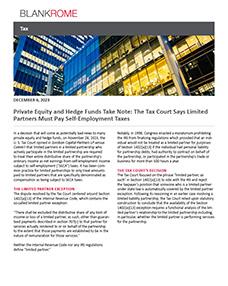Private Equity and Hedge Funds Take Note: The Tax Court Says Limited Partners Must Pay Self-Employment Taxes
In a decision that will come as potentially bad news to many private equity and hedge funds, on November 28, 2023, the U. S. Tax Court opined in Soroban Capital Partners LP versus Comm’r that limited partners in a limited partnership who actively participate in the limited partnership are required to treat their entire distributive share of the partnership’s ordinary income as net earnings from self-employment income subject to self-employment (“SECA”) taxes. It has been common practice for limited partnerships to only treat amounts paid to limited partners that are specifically denominated as compensation as being subject to SECA taxes.
The Limited Partner Exception
The dispute resolved by the Tax Court centered around Section 1402(a)(13) of the Internal Revenue Code, which contains the so-called limited partner exception:
“There shall be excluded the distributive share of any item of income or loss of a limited partner, as such, other than guaranteed payments described in section 707(c) to that partner for services actually rendered to or on behalf of the partnership to the extent that those payments are established to be in the nature of remuneration for those services.”
Neither the Internal Revenue Code nor any IRS regulations define “limited partner.”
Notably, in 1998, Congress enacted a moratorium prohibiting the IRS from finalizing regulations which provided that an individual would not be treated as a limited partner for purposes of Section 1402(a)(13) if the individual had personal liability for partnership debts, had authority to contract on behalf of the partnership, or participated in the partnership’s trade or business for more than 500 hours a year.
The Tax Court’s Decision
The Tax Court focused on the phrase “limited partner, as such” in Section 1402(a)(13) to side with the IRS and reject the taxpayer’s position that someone who is a limited partner under state law is automatically covered by the limited partner exception. Following its reasoning in an earlier case involving a limited liability partnership, the Tax Court relied upon statutory construction to conclude that the availability of the Section 1402(a)(13) exception requires a functional analysis of the limited partner’s relationship to the limited partnership including, in particular, whether the limited partner is performing services for the partnership.
What To Do Now
This is a case of first impression and is eligible for appeal to the United States Court of Appeals for the Second Circuit. Private equity funds who have limited partners and other limited partnerships will need to consult with their counsel and accountants to evaluate whether or how the Tax Court’s functional analysis test impacts them and/or whether they prefer to await the outcome of further litigation or IRS guidance.
For more information or assistance, please contact Dan Morgan, Jeffrey M. Rosenfeld, or another member of Blank Rome’s Tax, Benefits & Executive Compensation, or Trusts & Estates groups.


